Denying overtime wages affront to worker’s right to life: SC quashes Gujarat govt’s order
A three-judge bench headed by justice DY Chandrachud said that a worker’s right to life cannot be deemed conditional on the mercy of the employer or the government.
The Supreme Court on Thursday struck down the Gujarat government’s decision to exempt industries from paying overtime wages and increasing the working hours of employees by citing the public emergency and economic downturn caused by the Covid-19 pandemic and the subsequent lockdown.

In a strongly worded order, a three-judge bench headed by justice DY Chandrachud said that a worker’s right to life cannot be deemed conditional on the mercy of the employer or the government and the right to overtime wages and decent working conditions under the Factories Act of 1948 cannot be curtailed citing such grounds.
“The notifications (exempting factories from the purview of Factories Act), in denying humane working conditions and overtime wages provided by law, are an affront to the workers’ right to life and right against forced labour…Financial losses cannot be offset on the weary shoulders of the labouring worker, who provides the backbone of the economy,” the bench, which also comprised justices Indu Malhotra and KM Joseph, said.
The state cannot permit workers to be exploited in a manner that renders the hard-won protections of the Factories Act illusory and the constitutional promise of social and economic democracy into a paper tiger, the court added.
It also alluded to the hardships faced by workers and migrant labourers due to Covid-19 and the lockdown imposed by the government.
“The Covid-19 pandemic in India was accompanied with an immense migrant worker crisis, where several workers (including workers employed or contracted with factories) were forced to abandon their cities of work due to the halt in production which cut off their meagre source of income. The notifications in question legitimize the subjection of workers to onerous working conditions at a time when their feeble bargaining power stands whittled by the pandemic,” the judgment said.
The labour and employment department of Gujarat had issued a notification on April 17 under Section 5 of the Factories Act to exempt all units registered under the Act “from various provisions relating to weekly hours, daily hours, intervals for rest etc. for adult workers”.
The stated aim of the notification was to provide “certain relaxations for industrial and commercial activities” from April 20 to July 19. Another notification was issued on July 20 extending the relaxation until October 19.
The notifications allowed factories to increase the daily limit of working hours from 9 to 12 with a 30-minute break after every 6 hours as opposed to every 5 hours before the notification. It also did away with the requirement to give double the wages for overtime work and provided that wages proportionate to the ordinary rate can be paid even for overtime work.
The notification was issued under section 5 of the Factories Act, which allows the government to exempt industries from the purview of Factories Act on grounds of a public emergency. Section 5 defines public emergency as one that threatens the internal security of the country whether by war or external aggression or even internal disturbances.
Gujarat Mazdoor Sabha and the Trade Union Centre of India had moved the top court challenging the notifications.
The apex court held that section 5 cannot be invoked to provide a blanket exemption to all factories citing the Covid 19 pandemic and the contagion cannot be considered a public emergency threatening national security.
“The pandemic has put a severe burden on existing, particularly public health, infrastructure and has led to a sharp decline in economic activities. However, it has not affected the security of India, or of a part of its territory in a manner that disturbs the peace and integrity of the country. The economic hardships caused by Covid–19 certainly pose unprecedented challenges to governance. However, such challenges are to be resolved by the State Governments within the domain of their functioning under the law, in coordination with the Central Government,” the court said.
Unless the threshold of an economic hardship is so extreme that it leads to disruption of public order and threatens the security of India or of a part of its territory, recourse cannot be taken to such emergency powers, which are to be used sparingly under the law, the court added.
The petitioners had argued that Section 5 of the Factories Act provides for exemption only in cases of public emergency and that too for a factory or class of factories and it does not empower the state to provide a blanket exemption for all factories.
The court accepted this argument, ruling that section 5 of the Factories Act could not have been invoked to issue a blanket notification that exempted all factories from complying with humane working conditions and adequate compensation for overtime, as a response to a pandemic that did not result in an “internal disturbance” of a nature that posed a “grave emergency.”
“We accordingly allow the writ petition and quash the notifications dated April 17 and July 20. We direct that overtime wages shall be paid, in accordance with the provisions of Section 59 of the Factories Act, to all eligible workers who have been working since the issuance of the notifications,” the court ruled.
Get Current Updates on India News, Lok Sabha Election 2024 live, Infosys Q4 Results Live, Elections 2024, Election 2024 Date along with Latest News and Top Headlines from India and around the world.



